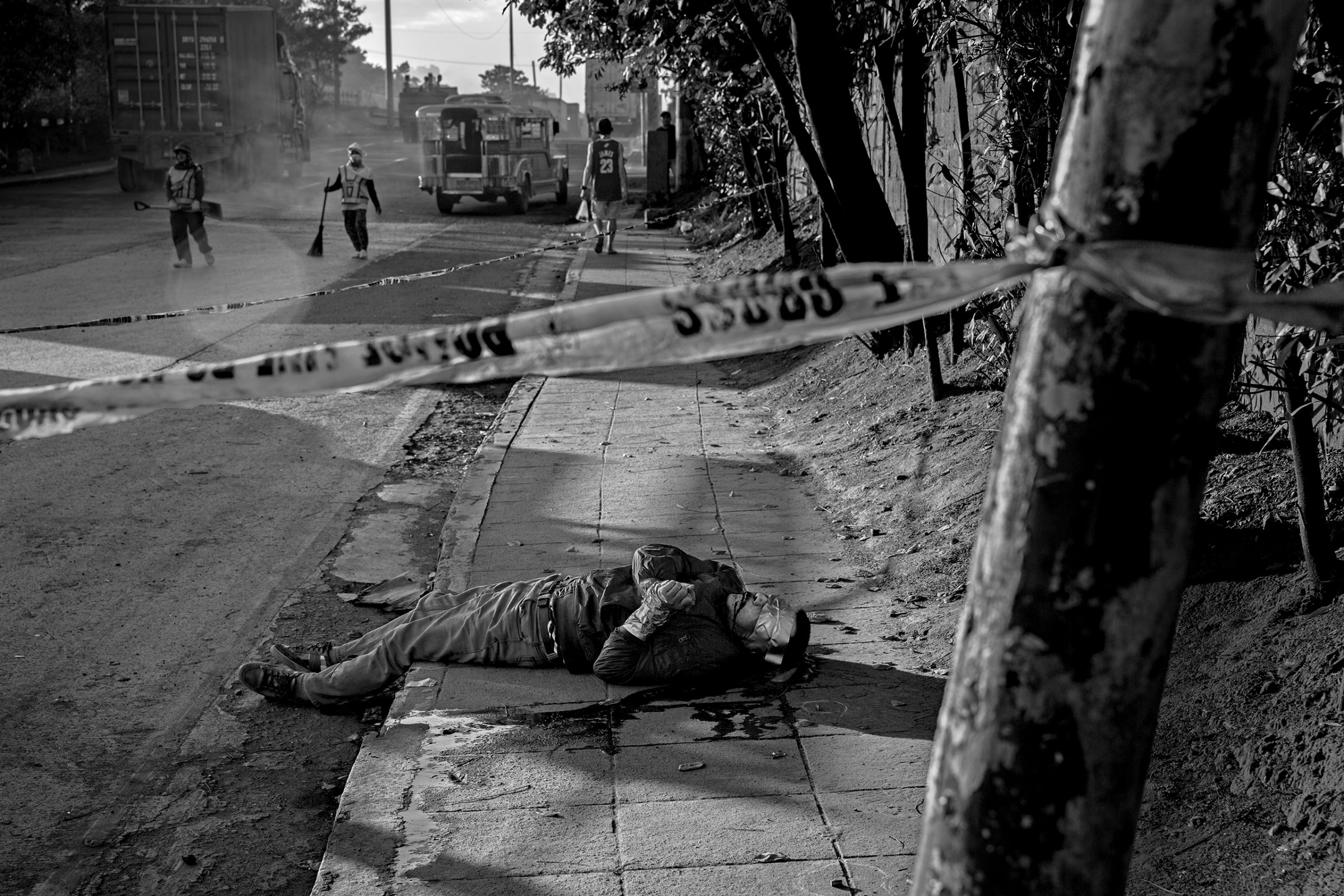
There is no God in Caloocan City, not tonight.
The lights have gone out in the window of the Catholic church in this Manila slum, and the hot rain falling on its streets isn’t enough to wash the stench of human sewage from the air. It’s a quarter to 2 in the morning. A hand-painted public-service announcement hangs on the rusted tin wall of a corner shop: Stay away from drugs! get into sports!
Up the muddy lane, police officers climb a flight of concrete stairs to a narrow corridor where there is a fresh body–one of at least five people summarily executed in Manila on this night, Dec. 7, five more killed in Philippine President Rodrigo Duterte’s relentless war on drugs. The residences within Manila’s slums are stacked haphazardly on top of one another, affording little privacy, but the man’s neighbors did not come out to look when they heard the gunshot–maybe to avoid trouble, maybe because they’re used to this by now.
See James Nachtwey’s photos from Manila
The victim appeared to be in his mid-20s, and he wore black athletic shorts and rubber flip-flops, one of which buckled under his weight when he fell. There is little blood this time. The police won’t disclose his name, which may be fitting, since in wartime, the dead are often relegated to the anonymity of statistics. Since Duterte took office in late June, more than 6,000 people have been killed in his campaign to purge the Philippines of illegal drugs and those associated with them, according to reliable estimates by local media. The victims–suspected users and pushers–do not enjoy due process, and they are always killed at night, sometimes inside their own homes. The perpetrators are vigilantes, hired guns and likely cops too.
Duterte made no secret that this would happen. “All of you who are into drugs, you sons of bitches, I will really kill you,” he said last April, a month before he was elected. It wasn’t just campaign bluster. For 22 years Duterte had served as mayor of the southern city of Davao, where he took a pathological approach to restoring order to the city’s streets. Under his leadership, the extrajudicial killings of suspected criminals and drug users in Davao by vigilantes was practically state policy. In December, speaking to a group of businesspeople, Duterte admitted to personally killing a few himself while he was mayor. The reaction of the international community has been one of outrage and reproach: Zeid Ra’ad al-Hussein, the U.N. High Commissioner for Human Rights, said on Dec. 20 that Duterte should be investigated for murder; on the same day, folk-music legend James Taylor said he had canceled his February concert in Manila.
But many Filipinos take a utilitarian approach to the war on drugs: killing is bad, but a society tainted by drugs and crime is worse. About 77% of Filipinos are satisfied with Duterte’s performance, according to a poll conducted in December. On the dating app Tinder, some Filipino women have overlaid their profile pictures with “I’m a Filipino, and my President is Duterte!”
Duterte, 71, was the dark-horse candidate when he entered the 2016 presidential election. But disillusioned Filipinos, who saw the drug epidemic as a symptom of a broken sociopolitical system, quickly came around. They liked his coarseness–he has called both President Barack Obama and Pope Francis “son of a whore” and made jokes about raping women–and his record as a change agent, even when he advocates violence. Three decades after the fall of the kleptocratic dictator Ferdinand Marcos, politics in the Philippines, though now a democracy, is still corrupt and ineffectual. The country’s homicide rate was the highest in Asia in 2013, while the trade and consumption of methamphetamine are booming. The tourism industry, which employs 1 in 10 Filipinos and provides 7.8% of GDP, is reeling. Roughly a quarter of the population of nearly 100 million lives below the poverty line.
As grisly accounts of the drug war grip audiences worldwide, pro-Duterte Filipinos–and the President himself–have responded with increasingly hostile anti-Western sentiments. Duterte is willfully carrying out what he calls a “separation from the United States,” a former colonizer and longtime ally that has funneled troops and aid into the country for decades. Manila is now cozying up to Beijing, even though both governments dispute maritime territory in the South China Sea. Duterte has pledged to buy arms from China, and Beijing has promised to help build infrastructure in the Philippines, dealing a blow to American presence and prestige in the region.
Duterte’s fiercest critic is Senator Leila de Lima, a former Secretary of Justice who has attempted to wage a war in the legislature against a strongman President who she says is actually “rather meek.” Duterte and his allies have struck back, and de Lima fears impeachment, arrest or worse. But, she says, “Will I stop fighting? Over my dead body.”
More Must-Reads from TIME
- Cybersecurity Experts Are Sounding the Alarm on DOGE
- Meet the 2025 Women of the Year
- The Harsh Truth About Disability Inclusion
- Why Do More Young Adults Have Cancer?
- Colman Domingo Leads With Radical Love
- How to Get Better at Doing Things Alone
- Michelle Zauner Stares Down the Darkness
Contact us at letters@time.com